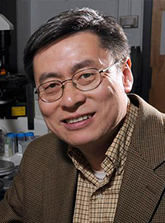Keynote Speakers
YOUR LOCATION : HOME > Annual Symposium > Keynote SpeakersKeynote Speakers

Xinzhong Dong, Ph.D.
E-mail : xdong2 (at) jhmi.edu
Job title :
Professor, The Solomon H. Snyder Department of Neuroscience, Johns Hopkins University
Investigator, Howard Hughes Medical Institute
Keynote Lecture
Mechanisms of Itch and Inflammation
Despite of the clinical importance, cell surface receptors mediating non-histaminergic itch are largely unknown. We identified a large family of G protein-coupled receptors in mice called Mrgprs. Many of these receptors are exclusively expressed in distinct subsets of small-diameter dorsal root ganglion (DRG) neurons. We found that MrgprA3 functions as a receptor for chloroquine (an anti-malaria drug) and is required for chloroquine-induced itch. Besides chloroquine, Mrgprs also respond to several itch-inducing compounds such as BAM8-22, SLIGRL, and beta-alanine suggesting that Mrgprs are novel itch receptors by directly sensing these compounds. Our data have shown the involvement of Mrgprs in mouse chronic itch models such as dry skin, contact dermatitis, and allergic itch. Importantly, some of the results have been confirmed in human psychophysical studies. In addition, we demonstrated for the first time that itch-specific sensory neurons do exist and are distinct from pain-sensing neurons. Besides the sensory neuron specific Mrgprs, we discovered another member of the gene family, MrgprB2, is exclusively expressed in mast cells, a type of innate immune cells, which secret many pro-inflammatory mediators like histamine upon activation. We found that human MrgprX2 and mouse MrgprB2 are the sole receptor of many basic secretagogues mediating IgE-independent mast cell activation and responsible for many drug-induced pseudo-allergic side effects. Therefore, we believe that targeting human Mrgprs may lead to novel treatment of various diseases in the future.

